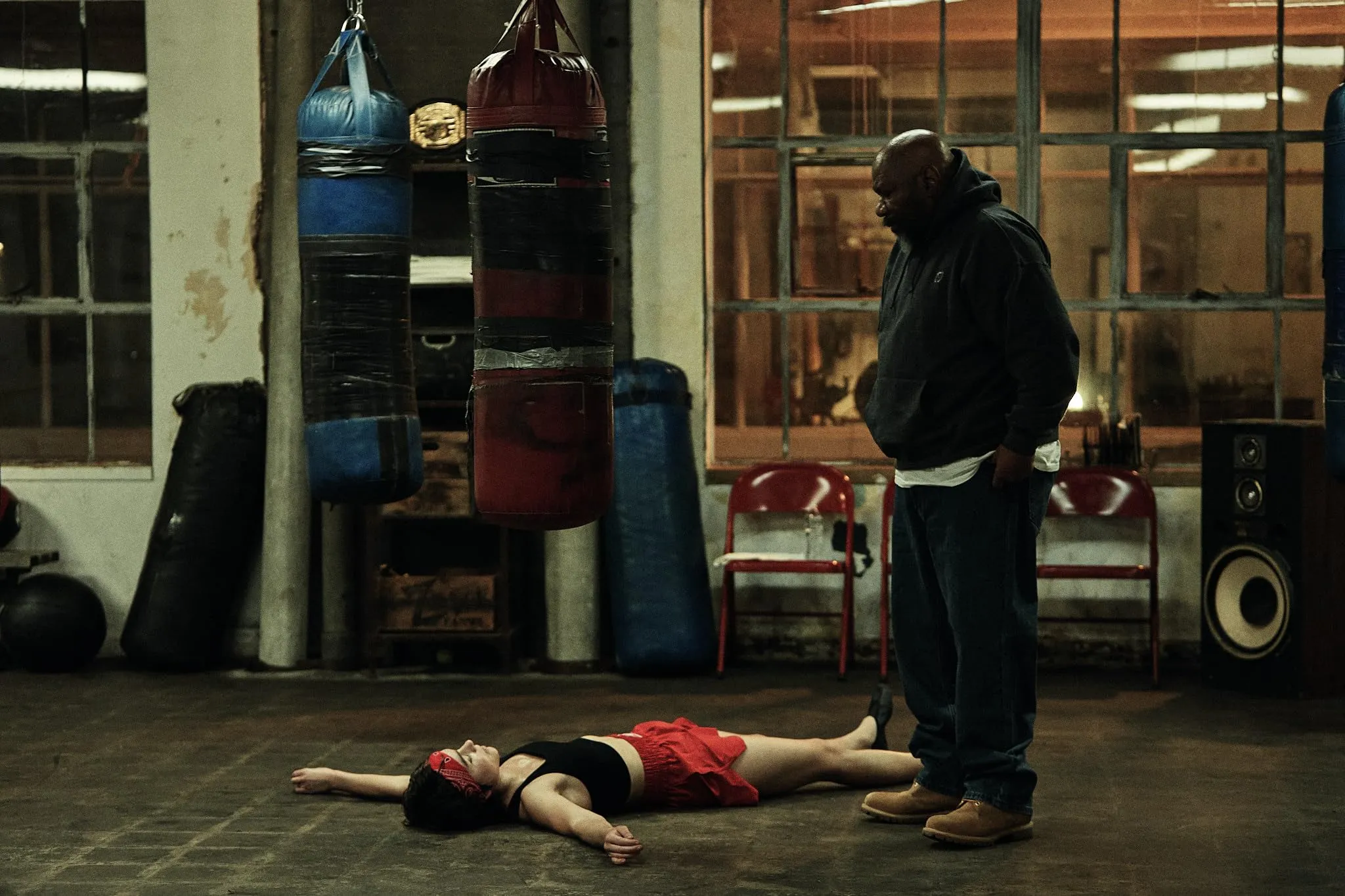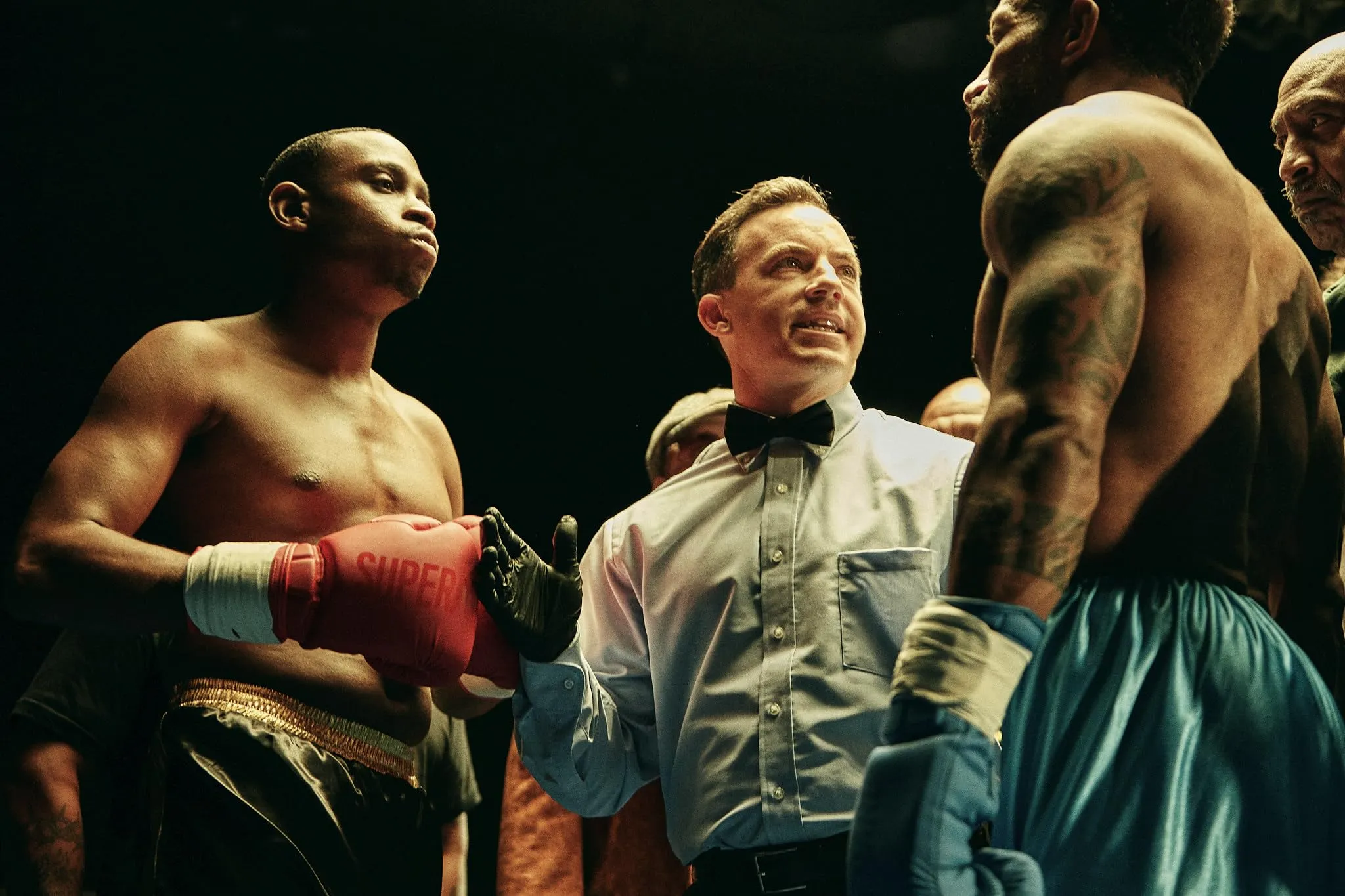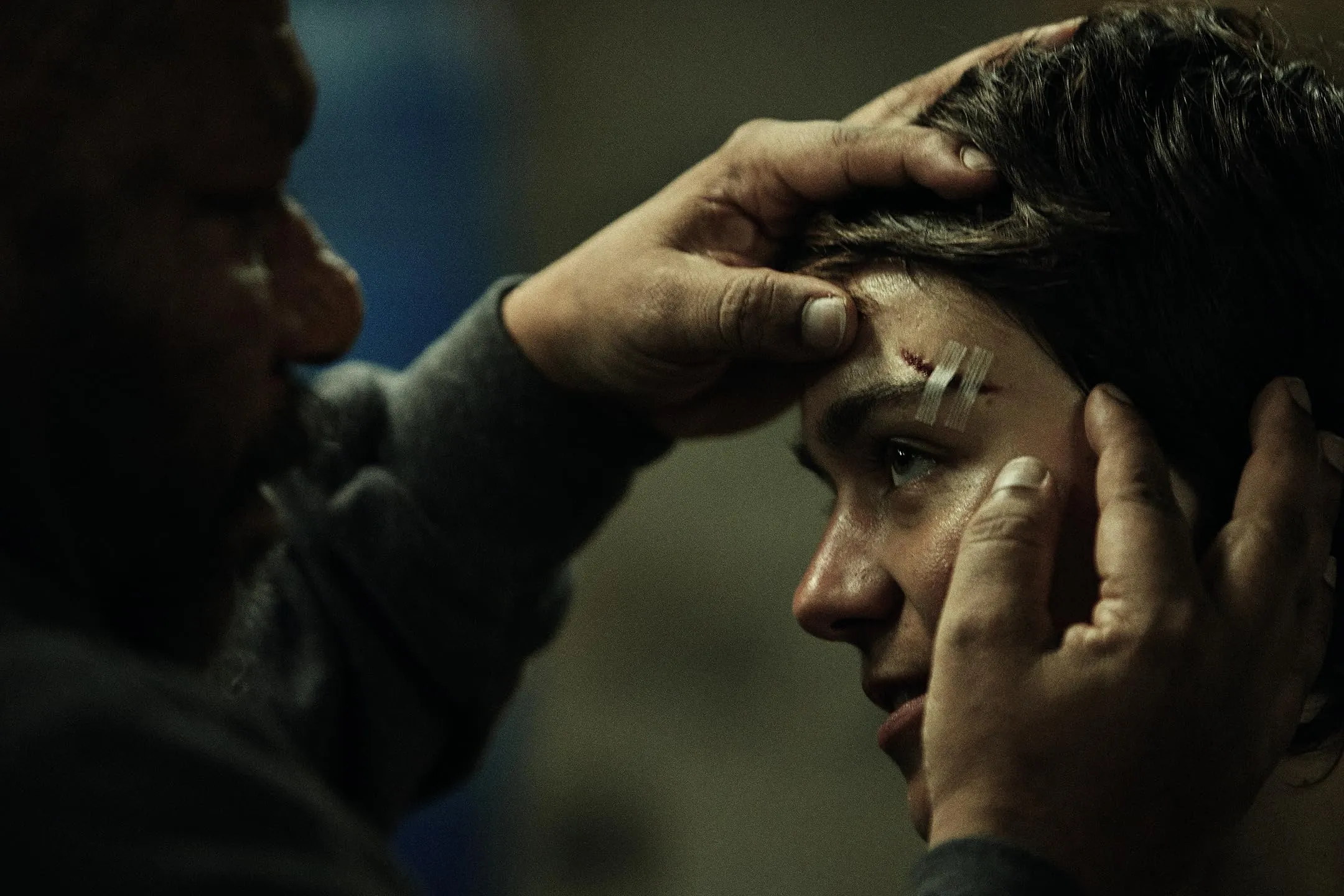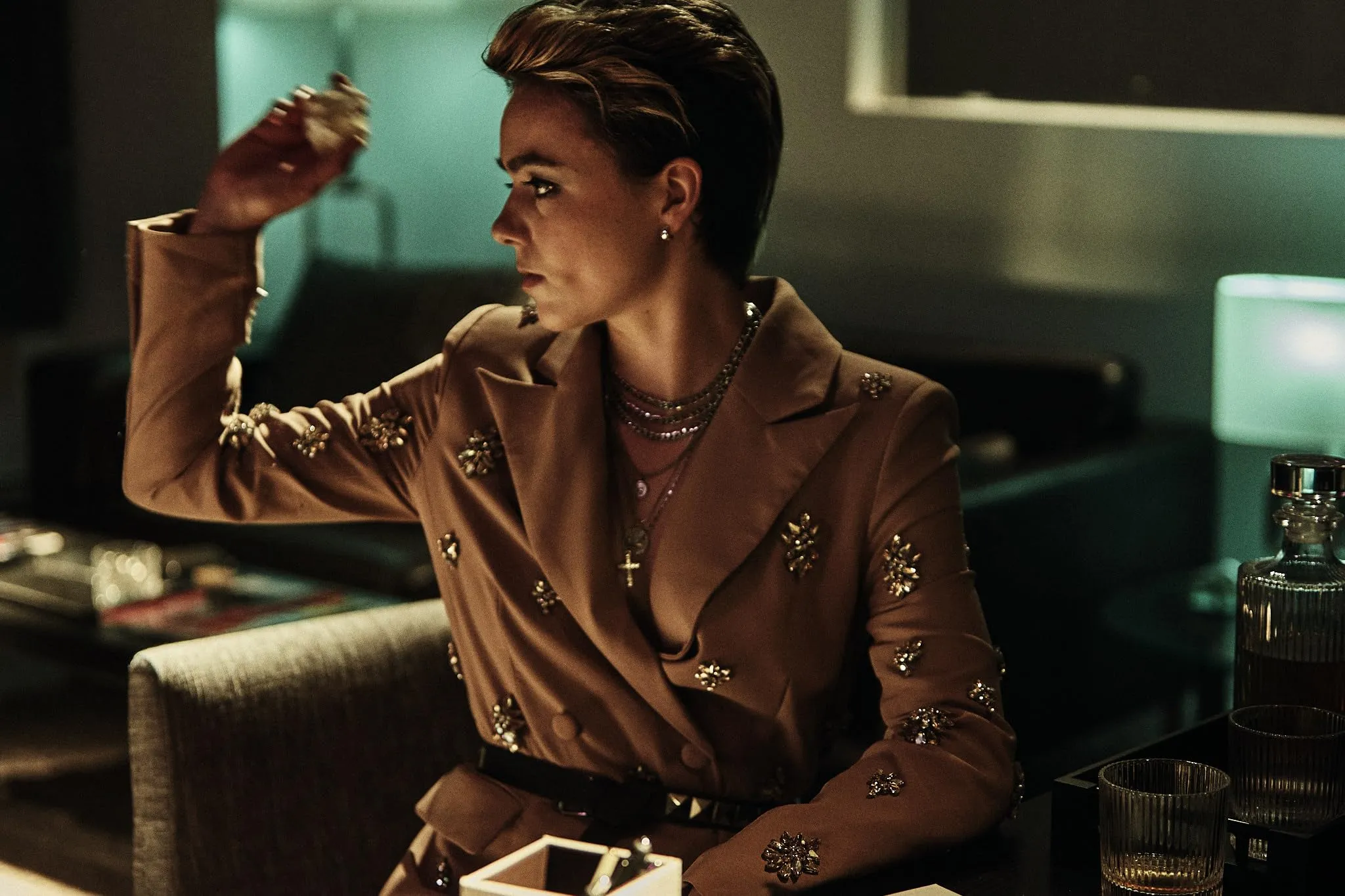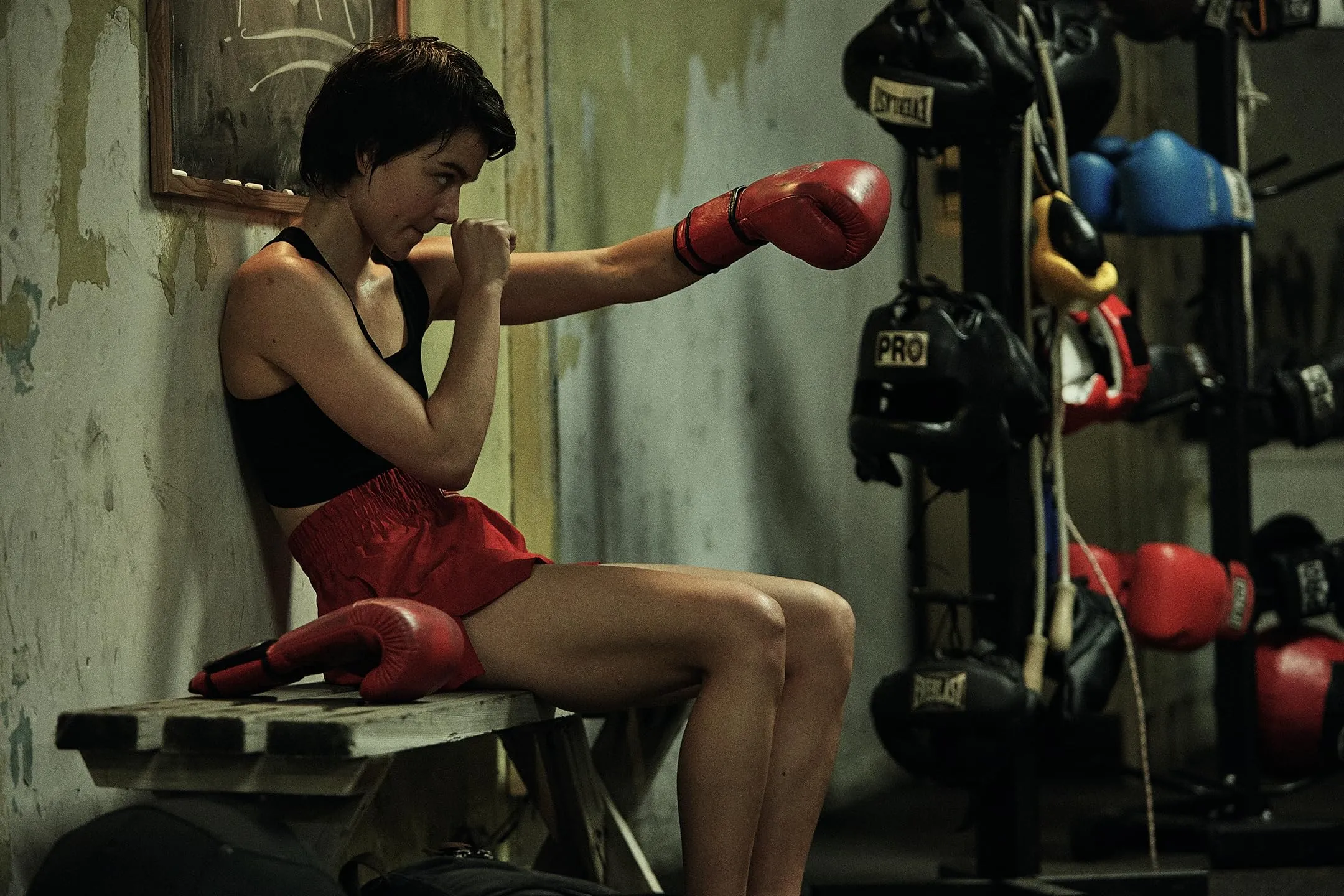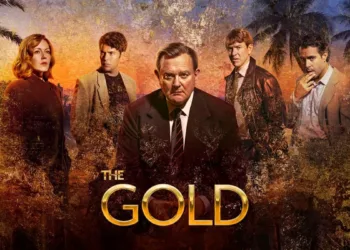“Uppercut” arrives as an American remake of Torsten Reuther’s German film Leberhaken (2021), stepping into the well-worn ring of underdog sports dramas with its own cultural twist. Here, Toni Williams—a determined young German—settles in New York City, intent on proving herself in the boxing world. The film alternates between her first night pleading for training in Elliott’s dimly lit gym and her later life as a confident manager guiding a rising fighter.
Reuther makes his English-language debut behind the camera, writing and directing with a clear affection for intimate character studies. Luise Großmann (billed as Luiii) brings a raw earnestness to Toni’s relentless drive, while Ving Rhames grounds the story with the weathered authority of a former champion turned trainer. Their sparring of words often carries more weight than the few punches that land on screen.
Although much of the work was filmed in Los Angeles, the production captures slices of New York grit—from grungy locker rooms to neon-lit streets. The film’s tone feels close and conversational, favoring extended exchanges over cinematic spectacle. By weaving past and present, “Uppercut” aims to explore how ambition and reflection shape a fighter’s identity.
Shifting Rounds: Time and Tension
“Uppercut” unfolds in two registers: the electric first night Toni Williams barges into Elliott’s gym and a later evening where she stands behind a young fighter’s corner. Reuther trims boxing scenes almost to a bare minimum, weaving flash-forwards so each jab of dialogue echoes a future test.
The “then” chronology—adrift in monologue before a single jab—reflects Toni’s raw drive but occasionally traps the viewer in an expository loop, while the “now” interludes shift to Payne Harris’s high-stakes title bout. That oscillation can jar but also invites an active gaze—one hears footfalls echo in the gym and then the roar of the crowd, like flipping radio stations mid-broadcast. It recalls Nolan’s “Memento,” though here the fractures sometimes blur more than illuminate.
Toni’s first act hinges on escaping her family’s shadow and demanding merit over inheritance. Her persistent plea to Elliott—refusing his initial refusal—mirrors current debates about privilege and ambition, even if the script wears thin on extended speeches. That back-and-forth taps into how a generation raised on bite-sized narratives can grow impatient with scenes that hover.
Reuther keeps gloves off-screen for nearly sixty minutes. That stretch tests narrative stamina. The offbeat focus on talk raises questions about risk and discipline, but lean indie viewers might expect more forward thrust. As someone who once laced up gloves for local shows in college, I admired how this pacing mirrors the tension before a first bell, though I’ve also felt the itch for action after too much buildup. I couldn’t help recalling Alejandro González Iñárritu’s “21 Grams,” where thematic fragments quicken pace rather than stall.
By midpoint, a single tennis-ball drill cuts through excess chatter—seeing Toni’s cheek split seals the promise of real conflict. In the “now” segments, Payne’s championship round supplies raw energy: every ring announcer’s word carries the weight of Toni’s past vows. Yet the film leaves Toni’s shift from boxer to manager underexplored, as if a crucial reel went missing during editing. It feels like an experimental riff on mainstream sports formulas, a gamble that sometimes lands as art-house provocation and sometimes as an unruly edit.
Punching Personality: Performances Under the Spotlight
Luise Großmann, credited here as Luiii, carries Toni Williams’s urgent pulse—one part defiance, one part uncertainty. Toni’s driving force is carved from a need to shed her “privilege daughter” label and prove worth on her own terms. Großmann nails that combustible mix: she storms into Elliott’s gym brimming with cocky determination, then shifts to a raw sulk when progress stalls.
You can almost feel the tension in her shoulders as she waits for a single jab of validation. Her background as a pole vaulter shows in the ease of her movements during sparring glimpses, lending authenticity to early training drills. Yet her German accent lands unevenly over English dialogue; lines meant to feel gritty sometimes wobble on unfamiliar syllables. That odd hitch can pull you out of her struggle rather than deeper into it, though moments of clear, unguarded emotion—her voice catching on a personal confession—remind you of her stakes.
Opposite Toni, Ving Rhames anchors Elliott Dufond’s story in lived-in gravitas. His ex-champion is haunted by past injuries and a sense of missed destiny, and Rhames allows a striking stillness beneath gruff retorts. He starts as a blocker—grumpy, reluctant to engage—then gradually shifts into a philosophical guide, imparting hard-earned wisdom. In scenes where Elliott tests Toni with tennis balls, Rhames’s measured timing elevates what could be a simple stunt into an almost poetic assessment of resilience. It echoes his earlier work in films like “Antwone Fisher,” where quiet strength speaks louder than showy lines.
Jordan E. Cooper’s Payne Harris brings fresh vigor as Toni’s managed fighter, though his character feels sketched in broad strokes. He offers moments of genuine gratitude and doubt, but the script leaves little room for his own backstory to breathe. Joanna Cassidy appears as Rita, a veteran coach squeezed into a few locker-room frames; her wise counsel could’ve mirrored Toni’s own journey, but remains underplayed. Peripheral figures—Toni’s unseen partner, Darius, and their daughter—hover as motivations rather than full presences, which sometimes makes the emotional landscape feel partially lit.
The core dynamic between Toni and Elliott flickers with real potential, but often feels like a staged two-hander. Their exchanges can drag when the script leans on long-winded speeches. By contrast, Toni’s brief manager–athlete moments with Payne crackle with promise, translating lessons learned into instinctive calls from the corner. It’s in these sparks that “Uppercut” hints at what might have been a more fully fleshed friendship forged in sweat and strategy.
Under the Lights: Visuals and Soundscape
“Uppercut” often frames its gym sequences like a two-character play—tight midshots on Toni and Elliott—before shifting into more kinetic compositions. That transition can feel abrupt; the initial stagey setup echoes indie dramas I’ve admired (think Kelly Reichardt’s quiet tension), and when DP Mattia Palombi steps in after Gevorg Juguryan’s departure, select scenes catch city haze and handheld grit. The change hints at production hurdles and offers brief moments of visual spark.
Editor Savannah Bayse weaves past and present with jump cuts that thrum like skipping vinyl. Some transitions inject energy into dialogue-heavy scenes, while others spin the timeline into mild disorientation. Compared to a traditional montage of punches and sweat, “Uppercut” opts for a talk-driven build. That pace risks dragging, though I’ll admit I found myself leaning into the ring’s ambient hum as much as the characters’ lines.
Production design balances New York grit with Hollywood practicality. Gym interiors feel genuine—scuffed floors, faded posters—yet a few “Brooklyn” exteriors reveal Los Angeles stand-ins. Toni’s dressing-room in the present is a tight bubble of fluorescent light, underscoring her isolation. The soundtrack nods to hip-hop rhythms during her street scenes, then drifts into spacious blues chords as Elliott’s voice-over guides her. Bell tolls and distant crowd noise anchor each moment in boxing’s visceral reality.
Words in the Ring
The screenplay leans heavily on familiar underdog tropes—pep talks, personal manifestos, and sporting maxims that feel repurposed from countless genre entries. Extended monologues on grit and sacrifice sometimes border on the theatrical, leaving viewers to wonder whether they’re really learning about Toni’s psyche or just checking off checkboxes.
Großmann’s accent brings a tension of its own. When she fires off lines like “They said I ain’t creek enough,” the slip from “quick” feels revealing of both cultural distance and lip-sync challenges. Toni’s attempt at Brooklyn swagger—dancing in the street to a hip-hop beat—registers as earnest while underscoring her outsider status.
Rhames’s Elliott shifts smoothly between old-school trainer aphorisms and wry asides, his gravitas calibrating the uneven register. Street slang bumps up against formal reflections, producing moments of unintended humor. Every so often a stray phrase lands with a laugh—or a grimace—as the film tries to fuse two linguistic worlds.
Echoes in the Ring: Themes and Symbols
At its core, Uppercut is a study in ambition and identity. Toni’s fight isn’t only against an opponent but against a life handed to her on a silver platter. I couldn’t help thinking of Rocky’s grit when she first insists on proving herself, though here the stakes feel more personal—she’s battling the privilege she never asked for. The boxing ring becomes a crucible where every jab tests her resolve and reshapes her sense of self.
The bond between Toni and Elliott stands as a meditation on mentorship and legacy. He insists he doesn’t train fighters, he makes them, and that philosophy echoes eight years later when Toni applies similar lessons to her own protégé. Watching this felt like revisiting the gym scenes in Creed, where past wisdom sparks new ambition.
Cultural translation oozes through the film’s veins. A German director remapping American boxing lore highlights both the allure and the awkward fit of an outsider’s gaze. Toni’s attempts at street vernacular underscore that sense of displacement—she’s here to belong, but never quite blends in.
Finally, gender and power thread every scene. Toni shatters expectations first as a boxer in a man’s arena, then as a female manager wielding authority. The film hints at the sport’s old-school gatekeeping, even if it doesn’t always press those edges as hard as it might.
The Final Round: Closing Thoughts
At its best, Uppercut pulses with Ving Rhames’s steady intensity, the fractured timelines that challenge viewer expectations, and moments of genuine athletic grace that recall raw indie boxing tales. The film’s willingness to linger on character exchanges over showy montages gives it a distinct identity in a genre often driven by spectacle.
Yet its title fight sometimes feels delayed by an overlong setup. Extended dialogue scenes test patience, and Toni’s accent hiccups can pull you from her emotional journey. Gaps in how she moves from hopeful boxer to seasoned manager leave questions unanswered, as if key scenes were left on the cutting-room floor.
This is a picture for those who favor character-driven, talky dramas—viewers drawn to stories that balance chamber-piece intimacy with the mainstream’s promise of the ring’s roar. If you’ve found yourself moved by films like Foxcatcher or intrigued by cultural remakes that recast familiar myths, Uppercut may land some meaningful blows.
For most, catching it on a streaming platform will reveal its strengths without the burden of a full-ticket price. If you crave crisp pacing over contemplative pauses, you might consider stepping out of this particular corner.
Full Credits
Director: Torsten Ruether
Writer: Torsten Ruether
Producers: Torsten Ruether, Luise Großmann, Matthew Berkowitz, Josef Brandmaier, Jim Rygiel, Steve B. Castor, among others
Executive Producers: Barry Brooker, Ryan Huffman, Katie Sarrels, Stan Wertlieb
Cast: Ving Rhames (Elliott Duffond), Luise Großmann (Toni Williams), Jordan E. Cooper (Payne Harris), Joanna Cassidy (Rita Stooth), Scott Monahan (Referee), Andrew Ibach (Philipp), Lynn Favin (The Cellist), Jaime Wallace (Blondie), Manny Ayala (Mitch), Fermin Padilla III (Hale), Vic Plajas (Tyrone Thribbs), Charles Massey (Jomar)
Directors of Photography (Cinematographers): Gevorg Gev Juguryan, Mattia Palombi
Editor: Savannah Bayse
Composer: Brass Against
The Review
Uppercut
Uppercut impresses with Ving Rhames’s steady gravitas and a fractured timeline that invites close attention, but its belabored setup, stilted dialogue, and unresolved narrative leaps keep it from landing the knockout punch.
PROS
- Ving Rhames’s commanding presence keeps scenes grounded
- Dual timelines add narrative intrigue
- Authentic training sequences showcase athleticism
CONS
- Slow-to-start pacing tests patience
- Dialogue-heavy stretches drag momentum
- Toni’s accent sometimes obscures key lines
- Gaps in Toni’s transition from boxer to manager









































